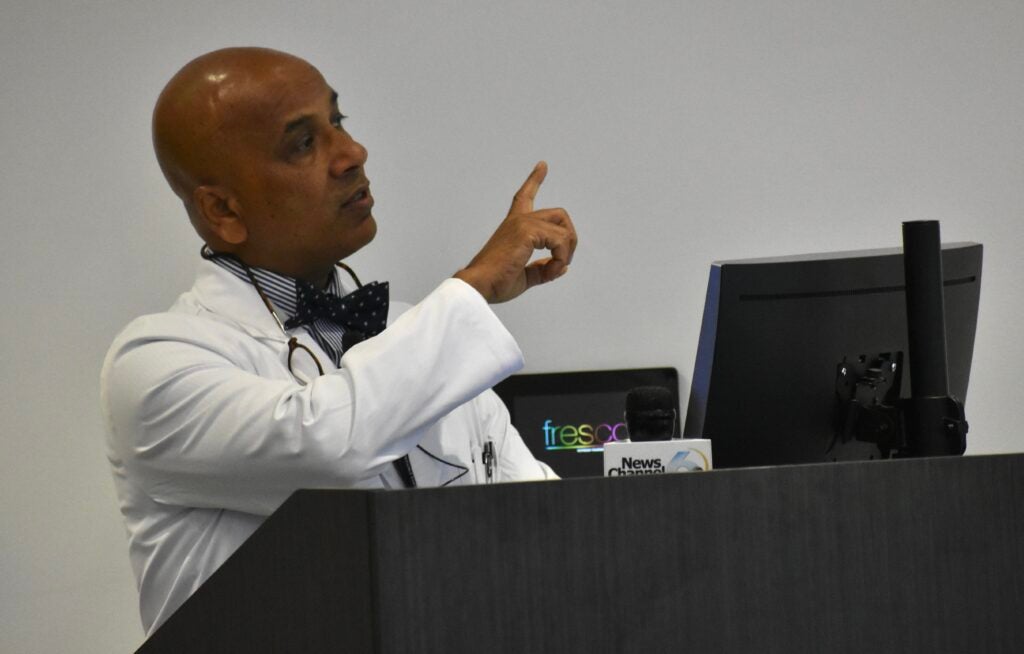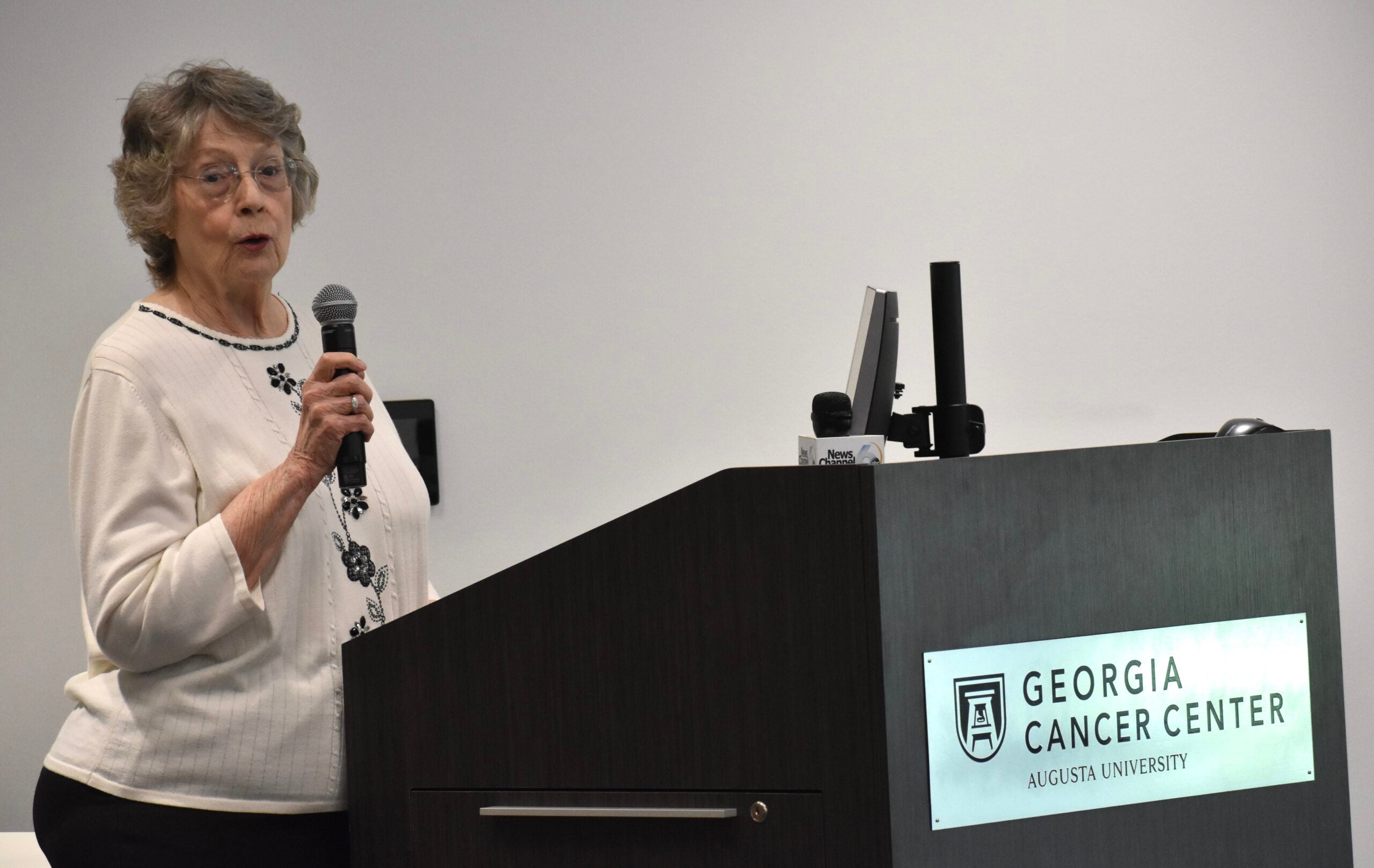Augusta University’s Georgia Cancer Center celebrated World Lymphedema Day by hosting a lunch, on March 6, designed to educate others on Lymphedema.
Lymphedema is best known to specialists as a weakening of the lymphatic system, which causes an increased collection of swelling that results in changes to the skin and tissue.
Frequently occurring as a result of cancer treatment or lymph node removal, certified Lymphedema therapist Hari Kashyap said a lack of knowledge about the chronic condition allows it to often go undetected, or diagnosed until developed into later stages. Kashyap said he seeks to change this medical oversight through education and communication.
“Every patient and family that I see is different,” he said. “There is definitely a lack of knowledge among most healthcare professions when it comes to [lymphedema]; it’s a very frustrating problem to have. A lot of times it’s misdiagnosed as obesity, which is why we see patients at later stages.”
In the beginning of her journey, prior to finding the Georgia Cancer Center, patient Beverly Roberts said she was extremely discouraged by the responses, and care she obtained from various doctors regarding her condition.
“The doctor came into [the room] … and he pulled his little stool up close to me, and he said, ‘I have nothing to offer you.’ Talk about exacerbation,” said Roberts. “I was not about to cry – I was about to cuss … if my leg keeps swelling like this, I’m not going to be able to get my slacks on.”
In her determination to find someone who would help, Roberts eventually found Kashyap who offered her relief after all the anger and frustration.
Corinne Daniel, another of Kashyap’s patients, also spoke at the event and shared how she had been dealing with primary lymphedema since she was in her 30s.
Now 84-years-old, Daniels said she wanted fellow patients to know that they could also survive, and still live an ideal life with lymphedema.
“Lymphedema is something you have to manage and treat,” she said. “You just need to learn to adjust, and adapt to it.”
Since there is no current cure for the life-long condition, Kashyap said he teaches patients that self-maintenance to affected extremities are vital to lessening the symptoms. He explained how clean skincare, compression bandaging and exercising can help control the fluid build up. However, some triggers are impossible to predict, such as insect bites, weather or humidity changes.

MORE: Augusta University helps prepare community motor coach drivers with health screenings
He also said outside factors, such as economic status and one’s environment, can also affect one’s chances of managing symptoms; using complete digestive therapy, compression pumps, and other helpful methods, he described his role in caring for patients as a long process that focuses on reducing flare-ups, and getting them back to a less severe state of health.
Although lymphedema is typically present in older adults around the age of 60s, Kashyap said he has treated local patients as young as high schoolers. He said one boy in particular, with severe facial swelling, suffered from head and neck lymphedema, and his confidence significantly decreased due to teasing and bullying at school.
“After about a year of treatment here though, he went back to school, and that felt really good,” said Kashyap.
Georgia Cancer Center Director Jorge Cortez, who specializes in blood viruses, cancers, and diseases, admitted that he was among the many that did not know enough about lymphedema, but he believed in advancing a facility that fostered professionals who do.
“Bringing this program even higher is very important to us. That’s what we want in a cancer center – to have very well-rounded, comprehensive management to help patients from every aspect that they need,” he said. “Things like managing one’s lymphedema, mental health issues or other elements that come with battling cancer are very important for those within our care.”
In addition to advocating for more insurance coverage of lymphedema treatments and equipment, Kashyap is also experimenting and researching new treatments everyday to work towards more effective solutions for current and future patients.
As a result of the on-going battle for more awareness about lymphedema, Kashyap also said one of his future goals for the center is creating a patient-family support group for those dealing with the chronic condition.
“I think it’ll be very impactful, because then patients won’t feel that I’m the only one going through this with them,” he said. “They’ll have a support network, and feel more reassured … we also learn from each other.”
Kashyap hopes that creating this support group will also allow patients to hold each other accountable, or even inspire one another when someone celebrates progress reducing their lymphedema.
“There is so much funding and support out there for things like cancer – breast cancer especially has a lot of support – but not so much for lymphedema, because people don’t know about it,” he said. “Maybe it’s not life threatening, but it does vastly deter people’s quality of life, and that matters. It affects their movement, their pain, their confidence; it’s important too, and I want more people to know.”
Liz Wright is a staff writer covering education, lifestyle and general assignments for The Augusta Press. Reach her at liz@theaugustapress.com











